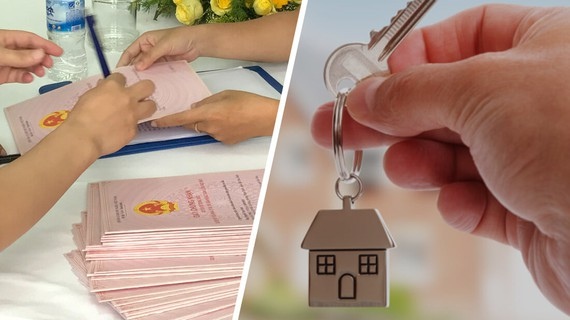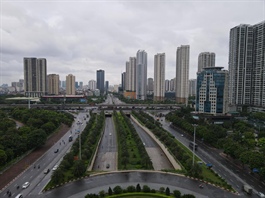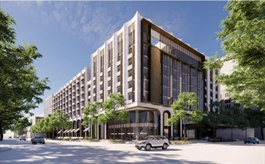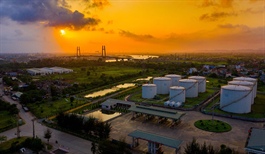Limited period ownership of apartments under debate
Limited period ownership of apartments under debate
Currently millions of people living in apartments in Vietnam are feeling insecure about a new draft proposal sent by the Ministry of Construction on a limited period ownership right to be held for only fifty or seventy years.
Illustrative photo. |
This new proposal is being debated across the country with many people discussing the repercussions that will follow should this law be passed.
In big cities such as Hanoi and Ho Chi Minh City there are more than 2,000 dilapidated apartments, with Hanoi recording 1,600, and Ho Chi Minh City recording 474. These apartments are rated under C and D category, which come under warning of danger to relocate. Although relocation and new construction plans have been laid out for the last twenty years, the number of new apartments built on the old land are still very few. Ho Chi Minh City has recently demolished and rebuilt five new apartment blocks, while Hanoi has only demolished and rebuilt six new apartment blocks so far.
There are many problems in demolishing old and dilapidated apartments to build new ones. One major problem lies in the fact that people cling on to these apartments and refuse to vacate their premises, even if the apartment is crumbling or subsiding into the ground. Local authorities, investors, and apartment dwellers cannot find a common voice; hence the situation remains unresolved and most of these old crumbling apartment houses cannot be redeveloped.
Faced with such a controversial situation, the Legal Department of the Ministry of Construction has proposed a solution to end this problem with an apartment ownership right to be held for a life term of fifty to seventy years only. At the end of this term, people must return the property to the state for building of a new apartment block or to be developed into a green park, or a parking lot, hotel, or even a restaurant. Once such a law is in place, residents of the apartment complex will be required to move out at the end of the term, or else they will be coerced under the law.
According to lawmakers, this will prevent people from stalling and bargaining, and the situation of redevelopment will become faster and hassle free. Supporters of this law cite examples in Europe and Singapore that have been very successful in the process of new development in housing and other social requirements.
This policy of a fifty-year ownership of an apartment was discussed by the Ministry of Construction about ten years ago, but at that time it was only looking at the technical aspect of it, which is to say that after fifty years the foundation structure of the apartment building would no longer be safe or usable. However, this time the Ministry wants to discuss the fifty-year period in terms of ownership of apartments and land. Lawmakers and managers want to separate the apartment and land issues in order to get people out of the apartments after a certain time period without facing any problems. This is what has caused a sharp reaction from people across the country.
Currently in Vietnam, there are two types of land-related apartment buildings, namely, apartments built on public land which belong to the State, and apartments built on land purchased by investors, or from partners, or leased from the State for a definite term, or rented from organizations, or bought through auctions.
There are apartment blocks sold to people where the investor clearly states that the land is on lease for a fifty-year term period and the buyer can only live in it for fifty years only. For instance, the Cong Hoa Garden apartment building in Tan Binh district is on lease hold land from the military and compared to other types of apartments the price of this type of apartment is much lower.
Other apartment complexes sell for more than VND 45 mn to VND 100 mn per square meter, where both seller and buyer understand that they have the right to own the apartment for perpetuity, which means that after fifty or seventy years when the apartment building is set for demolition their rights will still be attached to the land and they will continue to have the right to sell, transfer, or maintain right to live on that piece of land if they so wish.
For instance, if a 1,000 square meter apartment complex with buildings, parks, swimming pools, internal roads, and ancillary buildings has 1,000-unit apartments, it means that each apartment owner has full ownership right over one square meter of land. Therefore, at the time of selling the apartment, this clause can be clearly stated in the contract and the apartment owner will receive a title of one square meter, or a notarized certificate confirming the co-ownership of 1,000 square meters. Ownership of this land will no longer belong to the investor as the investor loses the right after selling this apartment. This property then does not belong to the investor, and it does not belong to the State either.
Therefore, after fifty or seventy or ninety years of use, when the apartment building has to be demolished, the people living in it will legally have the right to negotiate with a contractor to build new apartments, and they will only have to pay the construction costs. No one will have the right to decide for them, even if the land price increases many times over by then. However, the people concerned with such property must comply with the State regulations related to the duration of the work and construction standards at the time of new construction and other regulations related to traffic safety, environment, and fire prevention.
Every country has to face different and sometime difficult circumstances. For instance, soon after Singapore separated from Malaysia to become an independent country, Singapore adopted a policy that required the state to take care of people's housing needs.
In 1960, Singapore established the Housing Development Board (HDB), which is the only legal body with the task of solving the problem of social housing. Every five years the HDB orders private companies to build houses, villas, and apartments on state land. After that the government buys all completed projects from the construction contractors to ensure that contractors always profit and distribute the built-up housing to the people. Depending on each project, the HDB offers a reasonable selling price. After fifty or seventy or ninety years the state recovers the land and rebuilds again with better and new living conditions.
Once this law is passed in Vietnam, it will become effective only from the date of promulgation, but not applicable before that date. This means that the apartments built before the law is enacted will not be subjected to the rules applicable. The limited ownership time frame for an apartment is very necessary now, as the goal is to find a harmonious solution for the people to live in decent accommodation in the future, with better and safer conditions of living.






















